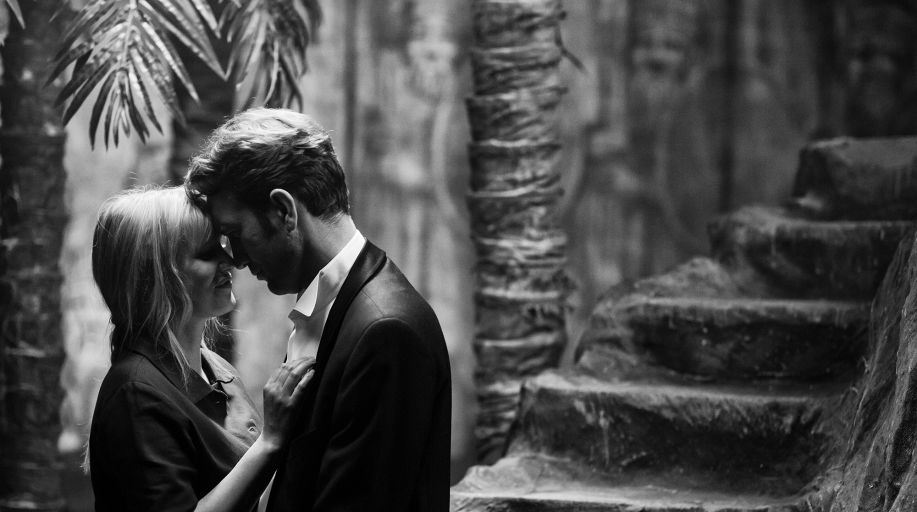
************************This review contains spoilers****************************
“You’re the drug running through my veins……and the crash right after.”
Cold War follows the relationship between two Polish lovers, Zula (Joanna Kulig) and Wiktor (Tomasz Kot) in postwar Europe. The pair embark upon a years long love affair spanning various countries, going back and forth between love and loss.
Cold War is a film about love, but one that delves into its realistic unpleasantness rather than the storybook portrayal of caring deeply for someone that we usually see portrayed onscreen. Zula and Wiktor are instantly drawn toward one another, like moth to flame. From the moment they first speak to each other while Zula is auditioning for the chorus that Wiktor leads, their chemistry is palpable and noticed by those around them. The story picks up with the couple every two to three years as their on again-off again union is rekindled. When they first begin dating, as the two grow closer, their union is ultimately tested when Wiktor asks Zula to defect to the West during a performance in Berlin. Zula agrees but no-shows, leaving Wiktor to sneak into West Berlin alone, ending their love affair. Two years later, they bump into each other when Zula comes to Paris to perform, this time abandoning her new beau and staying in the West with Wiktor. The rest of the film finds the couple continually rekindling their romance after drifting apart for increasingly problematic reasons; Wiktor striking Zula after she pokes at his slight jealousy of her rapport with his friend during an argument, Zula visiting Wiktor in a Polish prison camp after he defects back to the East in an effort to find her again, and the two running off together years after his incarceration after Zula marries a man and has his child in order to use his connections to gain Wiktor’s early release. Through this tumultuous relationship, Cold War documents the painful endurance of love; no matter how toxic some connections are, the participants in these painful love affairs that teeter back and forth between bliss and disaster cannot keep away from each other. It is clear that Zula and Wiktor are not the best match for each other but their connection and draw toward one another remains strong, even at the expense of each person’s well-being. This realistic depiction of an all too common type of relationship provides a valuable lesson about love differing from the fuzzy, happy endings that are more commonly portrayed and that all of us hope and think we will reach, despite the fact that Zula and Wiktor’s relationship is closer to what most of experience the most: Love is like fruit from a poisonous tree; the same substance that gives you pleasure can also end up hurting you.
Joanna Kulig offers an extraordinary performance as Zula, perfectly embodying the character’s headstrong, independent, and free-spirited personality. Zula’s presence is infectious, providing moments of levity but also fulfilling the tortured romance angle at the center of the film. Kulig is completely engrossing and believable in the role, providing an intense, mesmerizing energy that really powers the film. Tomasz Kot complements her well as Wiktor, aptly portraying a star-crossed lover and more reserved partner of an enigmatic, intense love interest. Their chemistry is extremely realistic and by the time the film is halfway through, you believe you’re watching a real couple rather than two actors in a performance.

Cold War’s exploration of a doomed connection that you know you should quit but cannot bring yourself too makes the love story at the center of the film one that its viewers will, unfortunately, be able to fully relate to. Everyone has entered into a fling or relationship that burns hot and fast, beginning with an intense flame and burning down in spectacular fashion just as quickly. From a technical standpoint, director Pawel Pawlikowski and director of photography Lukasz Zal supply the film with countless establishing shots and lush black and white color that perfectly compliment Cold War’s jazzy score and lounge sets. Zal provides us with one of the year’s best camera shots, pictured above, of Wiktor and two friends having a conversation with their backs turned to a mirror following a performance in Berlin. The created effect of the mirror appearing to be absent and the group appearing as if they’re in the middle of a room instead is masterfully executed and one of my favorite shots of the year. Joanna Kulig gives one of the best performances of the year as Zula, completely electrifying the screen and hypnotizing viewers as they watch.
Image: Apocalypso Pictures

